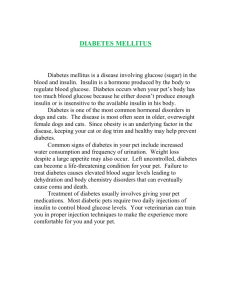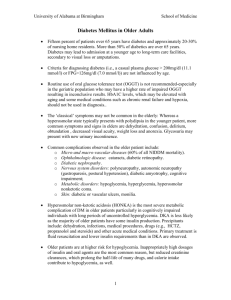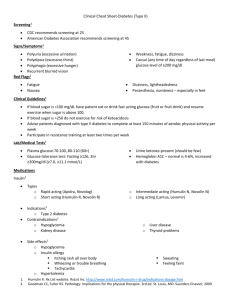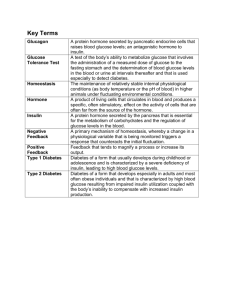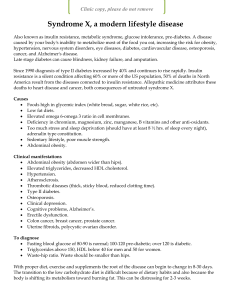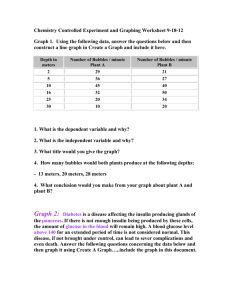Age 5, Injections
advertisement
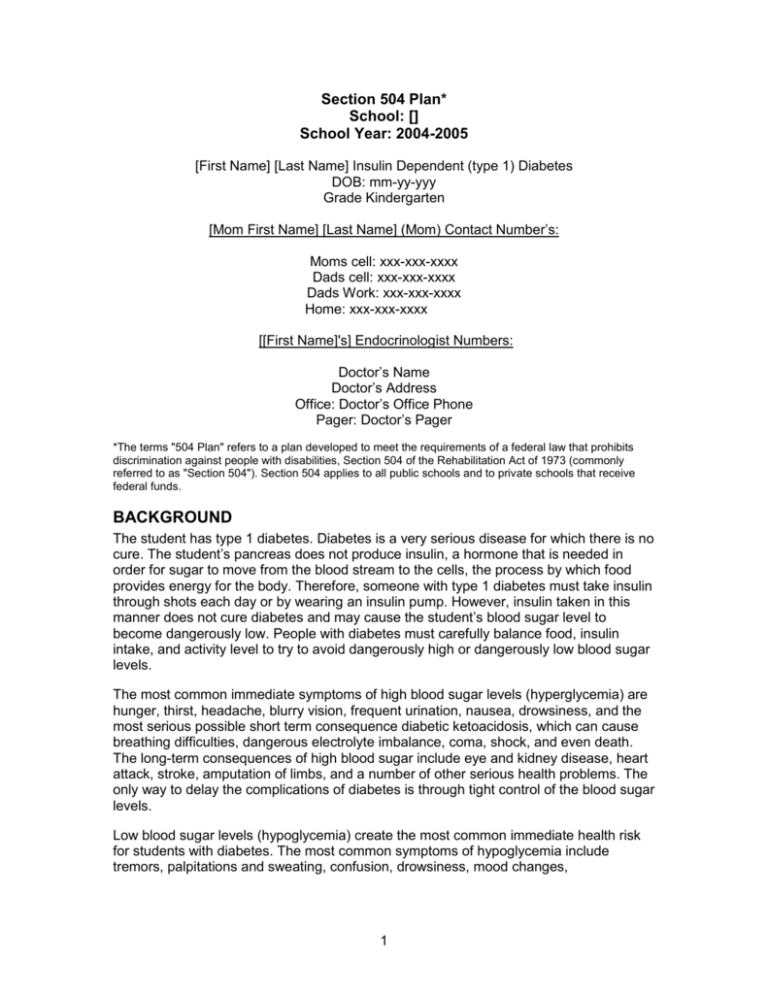
Section 504 Plan* School: [] School Year: 2004-2005 [First Name] [Last Name] Insulin Dependent (type 1) Diabetes DOB: mm-yy-yyy Grade Kindergarten [Mom First Name] [Last Name] (Mom) Contact Number’s: Moms cell: xxx-xxx-xxxx Dads cell: xxx-xxx-xxxx Dads Work: xxx-xxx-xxxx Home: xxx-xxx-xxxx [[First Name]'s] Endocrinologist Numbers: Doctor’s Name Doctor’s Address Office: Doctor’s Office Phone Pager: Doctor’s Pager *The terms "504 Plan" refers to a plan developed to meet the requirements of a federal law that prohibits discrimination against people with disabilities, Section 504 of the Rehabilitation Act of 1973 (commonly referred to as "Section 504"). Section 504 applies to all public schools and to private schools that receive federal funds. BACKGROUND The student has type 1 diabetes. Diabetes is a very serious disease for which there is no cure. The student’s pancreas does not produce insulin, a hormone that is needed in order for sugar to move from the blood stream to the cells, the process by which food provides energy for the body. Therefore, someone with type 1 diabetes must take insulin through shots each day or by wearing an insulin pump. However, insulin taken in this manner does not cure diabetes and may cause the student’s blood sugar level to become dangerously low. People with diabetes must carefully balance food, insulin intake, and activity level to try to avoid dangerously high or dangerously low blood sugar levels. The most common immediate symptoms of high blood sugar levels (hyperglycemia) are hunger, thirst, headache, blurry vision, frequent urination, nausea, drowsiness, and the most serious possible short term consequence diabetic ketoacidosis, which can cause breathing difficulties, dangerous electrolyte imbalance, coma, shock, and even death. The long-term consequences of high blood sugar include eye and kidney disease, heart attack, stroke, amputation of limbs, and a number of other serious health problems. The only way to delay the complications of diabetes is through tight control of the blood sugar levels. Low blood sugar levels (hypoglycemia) create the most common immediate health risk for students with diabetes. The most common symptoms of hypoglycemia include tremors, palpitations and sweating, confusion, drowsiness, mood changes, 1 unresponsiveness, and unconsciousness. Hypoglycemia can result in seizures, brain damage, or even death. Accordingly, for the student to avoid the serious short and long term complications of blood sugar levels that are either too high or too low, this Section 504 Plan, and the accompanying Health Plan, must be carefully followed and strictly adhered to by responsible school personnel. OBJECTIVE/GOALS OF THIS PLAN Both high blood sugar levels and low blood sugar levels affect the student’s ability to learn as well as seriously endangering the student’s health. Blood glucose levels must be maintained in the 90-180 range for optimal learning and testing of academic skills. The student has a recognized disability, type 1 diabetes, that requires the accommodations and modifications set out in this plan to ensure that the student has the same opportunities and conditions for learning and academic testing as classmates, with minimal disruption of the student’s regular school schedule and with minimal time away from the classroom. Steps to prevent hypoglycemia and hyperglycemia, and to treat these conditions if they occur, must be taken in accordance with this Plan and with the student’s Health Care Plan, which is attached to this Section 504 Plan and incorporated into it. DEFINITIONS USED IN THIS PLAN Authorized Diabetes Care Provider (ADCP): A school staff member who has received training in the care of individuals with diabetes from a certified diabetes nurse educator, a pediatric endocrinologist, or other diabetes medical specialist consistent with American Diabetes Association (ADA) guidelines as set out in the ADA National Standards for Diabetes Self-Management Education and that includes instruction in: the unassisted administration of glucagon and insulin shots and recording of results; understanding physician instructions concerning drug dosage, frequency, and manner of administration; applicable state regulations concerning drug storage, security, and record-keeping; symptoms of hypoglycemia and hyperglycemia and the time within which glucagon or insulin shots are to be administered to prevent adverse consequences; recommended schedules and menus for meals and snacks, recommended frequency of and activities in exercise periods, and actions to take if normal schedule is disrupted. Performing finger-stick blood glucose testing urine ketone testing and recording the results; and the appropriate steps to take when glucose level results are outside of the target ranges indicated in the student’s Health Care Plan. Diabetes Care Assistant Provider (DCAP): A staff member who has received training that is consistent with ADA guidelines and that provides instruction in: recognizing the symptoms of hypoglycemia and hyperglycemia; knowing the proper method for referring a student who exhibits symptoms of hypoglycemia or hyperglycemia to an ADCP; and recommended schedules and menus for meals and snacks, recommended frequency of and activities in exercise periods, and actions to take if normal schedule is disrupted. Bus Driver Diabetes Care Provider (BDDCP): A bus driver who has received training that is consistent with ADA guidelines and that provides instruction in: recognizing the symptoms of hypoglycemia and hyperglycemia; and knowing the appropriate steps to take when glucose levels are creating emergency conditions. 2 Health Care Plan: A plan developed under Section 504 of the Rehabilitation Act of 1973, the Americans With Disabilities Act of 1990, and, as appropriate, the Individuals With Disabilities Education Act, which identifies the health care, needs of – and services to be provided to – a student with diabetes. The student’s treating physician approves this plan. ACADEMIC-RELATED ACCOMMODATIONS HEALTH CARE SUPERVISION At least 4 adult staff members will receive training to be an Authorized Diabetes Care Provider (ADCP), and an ADCP will be available at all times during school hours, during extracurricular activities, and on field trips to oversee the student’s health care in accordance with this Section 504 Plan and the student’s Health Care Plan, including performing or overseeing insulin injections, blood glucose tests, ketone tests, and responding to hyperglycemia and hypoglycemia including administering glucagon. A written back-up plan will be implemented to ensure that an ADCP is available in the event that the primary ADCP is unavailable. Any staff member who has primary care for the student at any time during school hours, extracurricular activities, or during field trips, and who is not an ADCP, shall receive training to be a DCAP. Primary care means that the staff member is IN charge of a class or activity in which the student participates. Any bus driver who transports the student when neither an ADCP nor DCAP is present must be a BDDCP. TRAINED PERSONNEL The following school staff members (including but not limited to school administrators, teachers, counselors, health aides, cafeteria and library staff) will be trained to become Authorized Diabetes Care Providers (ADCPs) by [nurse], RN, CDE on [date to be trained]. The following School staff members (including but not limited to school administrators, teachers, counselors, health aides, cafeteria and library staff) will be trained to become Diabetes Care Assistant Providers (DCAPs) by [nurse], RN, CDE on [date to be trained]. ___________________________________________________________________ The following bus drivers will be trained to become Bus Driver Diabetes Care Providers (BDDCP) by [nurse], RN, CDE, on [date to be trained]. __________________________________________________________________ SNACKS AND MEALS An ADCP will work with the student and his/ parents/guardians to coordinate a meal and snack schedule in accordance with the attached Health Care Plan that will coincide with the schedule of classmates to the closest extent possible. The student shall eat lunch at the same time each day, or earlier if experiencing hypoglycemia. [First Name] is in a carbohydrate count, diet of 40g. per meal. The student shall have enough time to finish lunch. A snack and quick-acting source of glucose must always be immediately available to the student. 3 The parents/guardians will pack snacks for each day and will provide a supply of additional snacks to be kept at the school to treat hypoglycemia or for emergency situations. All school personnel will permit the student to eat a snack in the classroom or wherever the child is (including, but not limited to classrooms, gym, auditorium, playground, field trips, and school bus) at times designated in the Health Care Plan and whenever needed to treat hypoglycemia or in response to a change in the student’s regular schedule. A source of glucose will be immediately available wherever the student is. A designated ADCP or DCAP will ensure that the student takes his 15-20 carbohydrate counted snacks at the specified time(s) each day. The attached Health Care Plan sets out the regular time(s) for snacks each day, what constitutes a snack, when the student should have additional snacks, and where snacks are kept. WATER AND BATHROOM ACCESS The student shall be permitted to have immediate access to water by keeping a water bottle in the student’s possession and at the student’s desk, and by permitting the student to use the drinking fountain without restriction. The student shall be permitted to use the bathroom without restriction. TREATING LOW BLOOD SUGAR The student shall have immediate access to blood glucose testing equipment, and glucose in the form of food 15g or 4oz cup juice glucose gel or tablets in order to treat hypoglycemia. The student shall be permitted to carry this equipment with him/ at all times. When any staff member believes the student is showing signs of high or low blood sugar, the staff member will seek a designated ADCP for further assistance while making sure an adult stays with the student at all times. Never send a student with actual -- or suspected -- high or low blood sugar anywhere alone. High or low blood sugar levels should be treated as set out in the attached Health Care Plan. Any staff member who finds the student unconscious will immediately contact the school office & dial 911. The office will immediately notify an ADCP and DCAP do the following in the order listed: 1. Call 911 (office staff will do this without waiting for the ADCP to administer glucagon). 2. Contact an ADCP who will confirm the blood glucose level with a monitor and immediately administer glucagon 4 3. Contact [First Name]'s parents and physician at the emergency numbers, provided below The location of supplies for treating high and low blood sugar levels, including equipment for testing blood glucose levels and ketones, glucagon, and snacks, is set out in the attached Health Care Plan. GLUCOSE TESTS Blood glucose tests will be administered in accordance with the level of self-care listed in the chart in section 3 above and the attached Health Care Plan. Glucose tests may be done at any location at school, including, but not limited to, the classroom, on school grounds, at field trips or sites of extracurricular activities, or on the school bus. Glucose tests will be done at the times designated in the student’s Health Plan, whenever the student feels that his blood sugar level may be high or low, or when an ACDP or DCAP observes symptoms of hypoglycemia or hyperglycemia. The student’s usual symptoms of high and low blood sugar levels are set out in the attached Health Care Plan. The location of glucose testing equipment is set out in the attached Health Care Plan. An ADCP will perform glucose tests when the student is unable or chooses not to do the test him/self. INSULIN INJECTIONS Insulin will be administered in accordance with the level of self-care listed in the attached Health Plan. The location of insulin and equipment to administer insulin is set out in the attached Health Care Plan. FIELD TRIPS AND EXTRACURRICULAR ACTIVITIES The student will be permitted to participate in all field trips and extracurricular activities (such as sports, clubs, and enrichment programs) without restriction and with all of the accommodations and modifications, including necessary supervision by identified school personnel, set out in this Plan. The student’s parent/guardian will not be required to accompany the student on field trips or any other school activity but will need to be notified. An ADCP will accompany the student on all field trips and extracurricular activities outside of the school’s premises and will provide all usual aspects of diabetes care (including, but not limited to, blood glucose testing, responding to hyperglycemia and hypoglycemia, providing snacks and access to water and the bathroom, and administering insulin and glucagon). Either a DCAP or an ADCP will be available at the site of all extracurricular activities that take place on school premises. An ADCP must be on the school premises whenever the student is present. 5 The student’s diabetes supplies will travel with the student to any field trip or extracurricular activity on or off of school premises. TESTS AND CLASSROOM WORK 1. If the student is affected by high or low blood glucose levels at the time of regular testing, the student will be permitted to take the test at another time without penalty. 2. If the student needs to take breaks to use the water fountain or bathroom, do a blood glucose test, or to treat hypoglycemia or hyperglycemia during a test, the student will be given extra time to finish the test without penalty. 3. The student will be permitted to have extra time to finish classroom work if the student is affected by high or low blood glucose levels or needs to take breaks to use the water fountain or bathroom, do a blood glucose test, or to treat hypoglycemia or hyperglycemia without penalty. 4. The student shall be given instruction to help him/her make up any classroom time missed due to diabetes care without penalty. 5. The student shall not be penalized for absences, and delays required for medical appointments and/or for illness. DAILY INSTRUCTIONS 1. An ADCP or DCAP will notify parent/guardian 3 days in advance when there will be a change in planned activities such as exercise, playground time, fieldtrips, parties, or lunch schedule, so that the lunch or snack plan can be adjusted accordingly. 2. The parent/guardian may send the ADCP special instructions regarding the snack, snack time, or other aspects of the student’s diabetes care in response to changes in the usual schedule. 3. An ADCP must provide any substitute teacher with written instructions regarding the student’s diabetes care and a list of all ADCPs and DCAPs at the school. EQUAL TREATMENT AND ENCOURAGEMENT 1. Encouragement is essential. The student must not be treated in a way that discourages the student from eating snacks on time, or from progressing in doing his/her own blood glucose tests and general diabetes management. 2. The student shall be provided with privacy for blood glucose testing and insulin administration if the student desires. ADCPs, DCAPs, BDDCPs, and other staff will keep the student’s diabetes confidential, except to the extent that the student decides to openly communicate about it with others. PARENTAL NOTIFICATION NOTIFY PARENTS/GUARDIANS IMMEDIATELY IN THE FOLLOWING SITUATIONS: * Symptoms of severe low blood sugar such as continuous crying, extreme tiredness, sweaty palms, pale skin, irritable or loss of consciousness. *The student’s blood glucose test results are below 70 or are below 80, 15 minutes after consuming juice or glucose tablets. *Symptoms of severe high blood sugar such as frequent urination, extreme thirst, hunger, blurred vision, drowsiness, or presence of -large ketones or blood glucose level above 300. *The student refuses to eat or take insulin injection. *Any injury. 6 *Other: Any reason you feel you need to contact Mom (Cell: [xxx-xxx-xxxx]). EMERGENCY CONTACT INSTRUCTIONS 1. Call the student’s mother at work. If unable to reach parent/guardian: 2. Call the student’s parent/guardian’s cell or work phone. If unable to reach parent/guardian: 3. Call [Mom’s First Name](Mom) at [xxx-xxx-xxxx] If unsuccessful: 4. Call [Mom] at [Home][ xxx-xxx-xxxx] EMERGENCY CONTACTS: [Father’s First Name] (Father) Cell: [xxx-xxx-xxxx] Work: [xxx-xxx-xxxx] Home: [xxx-xxx-xxxx] Other emergency contacts: [Emergency Contact] (Relation)] Home: [xxx-xxx-xxxx] Cell: [xxx-xxx-xxxx] Student’s Physician(s): Doctor’s Name Doctor’s Address Doctor’s Phone Number This Plan shall be reviewed and amended at the beginning of each school year or more often if necessary. Reviewed: _______________________________________________ Physician Signature & Date _______________________________________________ Parent/Guardian Date _______________________________________________ School Representative and Title Date 7


